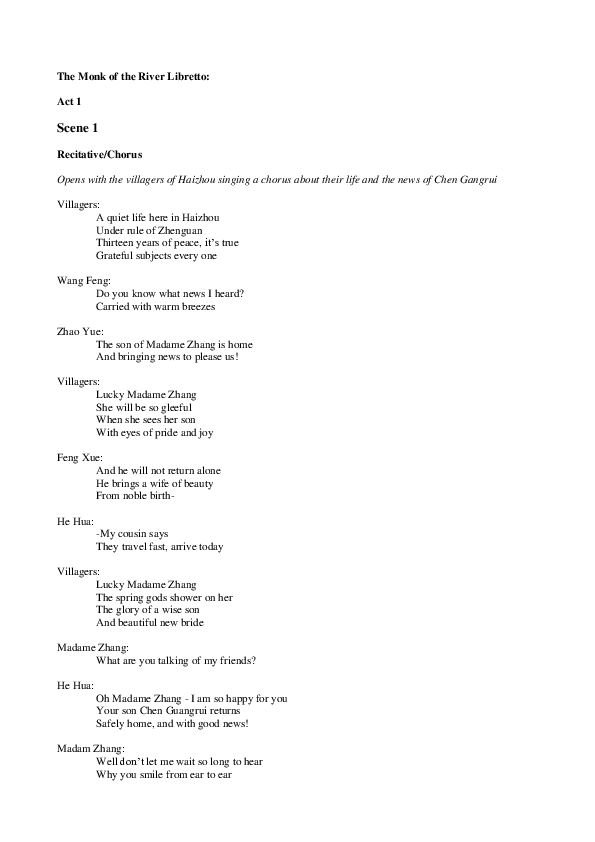Appendix 3 – Other Related Works
Throughout the whole time frame of the PhD I was conscious to allow the reflections and learnings from all of my artistic activities relating to opera creation and performance, to influence the subsequent work I produced. The impact of the COVID restrictions right at the beginning of my data collection stage also meant that I had to seek to broaden the kind of work I was producing, so as to be able to work within the lockdown restrictions. This meant that I became involved in some projects which will not be used as key case studies in this PhD, but which nevertheless contributed greatly to the ongoing development of my method and understanding of the efficacy of my creative process and aims.
AP 3.4.a The Monk of the River
The first of these operas, The Monk of the River, was written during 2020 and performed at the Tête Á Tête Festival in September 2021. The production was funded by Arts Council England. This part of the novel tells the story of Xuanzang’s parents, and describes how he came to be a monk of the Emperor Tang. There are many characters, each with their own plot, and so it was a very dense story to portray in a one hour show. If I were able to go back and rework this I would ask Anna if we could cut out some characters and streamline the story to fewer key events. The libretto for this opera can be found on the right.
AP 3.4.b The Monster of Gao
In September 2023 The Monster of Gao premiered again at the Tête Á Tête Festival. After having worked on such a complicated story for the previous instalment I asked Anna if we could focus on a less complicated element of the journey, which involves fewer characters and would allow us to explore each character more fully. We decided to focus on the introduction of the Pig character Zhu Bajie. The libretto for this work can be found on the right.
AP 3.4 The Monk of the River and The Monster of Gao
Whilst working on the projects for the PhD I also began collaborating with the composer Anna Vienna Ho on a series of short opera which present some small sections from the Chinese epic novel – Journey to the West (attributed to Wu Cheng’en). This novel is an account of the journey of the pilgrim Xuanzang to the Buddhist monastery in the West, to collect the ancient scriptures and Tripitaka from the Buddha. On the way Xuanzang encounters several friends and enemies, and faces a series of potentially deadly challenges.
As this had been a long-term dream of Anna Vienna Ho to write, she had already decided on the sections of the novel she wanted to compose. Therefore the task was to me to pull together the complicated and eventful narrative into a short and concise text. I did so using as many translations as I could find, in order to adapt it as close as possible to the original text, as well as to be able to make informed decision on the wording and inherent intentions of each character.

